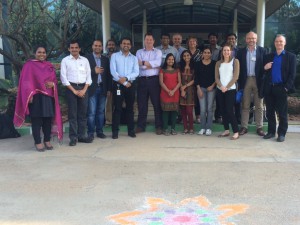4th March 2014 New Delhi, India
A Social event in Bangalore
In February, we had a delegation from the UK to discuss social media analytics and web science with Indian counterparts. The workshop was hosted by IIIT-B and run in collaboration with Cognizant, ESRC and the RCUK Digital Economy Programme. We had presentations from a wide range of contributors (Indian and British, academia and industry, computer scientists and social researchers). Professor Derek Macauley represented the UK’s Connected Digital Economy Catapult Centre at the event. If you want to know what was talked about, many of the group were tweeting with #UKIndiasocial, and the report (including many of the presentations) from the event is also available.
It was deliberately an interdisciplinary group, and the presentations varied in theme and focus. In a true demonstration of the power of the web, Professor Gerard Parr and Dr Cathy Mulligan presented via Skype. By the end of the presentations some common themes emerged:
- Creation of a Web Observatory in Bangalore: Professor Dame Wendy Hall explained the background to the Web Science Trust’s mission and growing network of web observatories around the world. They are a place to share open data on how the web is used, and for that data to be used and analysed by academics and industry, then returned to the observatory for others to use.
- Social machines into action: Professor David De Roure explained the concept of social machines (my inexpert interpretation being many people acting together through online tools). Many of the presentations highlighted examples of social machines becoming something outside of the web. We heard about social networks effecting business change, apps to crowd source information about the location of artwork, or massively open online course spontaneously spawning real-world local support groups.
- Crowd sourcing for disruption response: Professor Pete Edwards talked through some of his group’s work on Twitter and travel disruption and multiple talks used data from social media during major weather events as case studies. Pete introduced some questions: how to define the provenance of data sourced from social media, and use it to make judgements about accuracy? If data from social media is to be commercially useful, or inform our response to disruption (such as natural disasters, terrorism or travel delays), then answering these has got to be a priority.
- Online Trust and Privacy: Professor PK gave an illuminating account of what information it is possible to gather from public sources on the web and, with tools, collate into some fairly detailed descriptions of individuals (for instance see MultiOSN). From his, and others’, talks it was clear that privacy is a fluid concept on the web. Of particular interest was what privacy concerns need to be addressed in order to be able to deliver public services through the web. With projects like Aadhaar coming through, this will be an important question for India.
On the second day, we were divided into smaller groups to discuss the above emerging themes and what actions were necessary to take forward new research relationships. A major outcome was that IIIT-B will take forward the establishment of a Web Observatory in Bangalore, which is sure to be a great addition to the network. Several of the group were keen to hold a Web Observatory Workshop in Bangalore later this year, with others also interested in a wider event on social media and analytics. Rather than being another research discussion, this would be an opportunity for young researchers from the UK and India to get together for a week, carry our joint analysis of with big data sets about web use and show off what they can do.
Several of the group stayed on in Bangalore to visit companies and institutions in the city. They explored the ongoing relationship between the Web Science Trust and Infosys, while others learnt about Infosys’s impressive sustainability programme. We also had a meeting at Cognizant to understand their fascinating social media analytics tools and showcase of some of Microsoft Research’s work, such as IVR Junction, for emerging markets.
 It was busy three days, with rich discussions emerging on a number of fronts. As ever, the real work starts in the follow up. Where better to try this than the home of Indian IT though? Watch this space for news on that, and thanks to all the participants for making it such a stimulating three days.
It was busy three days, with rich discussions emerging on a number of fronts. As ever, the real work starts in the follow up. Where better to try this than the home of Indian IT though? Watch this space for news on that, and thanks to all the participants for making it such a stimulating three days.
2 comments on “A Social event in Bangalore”
Comments are closed.